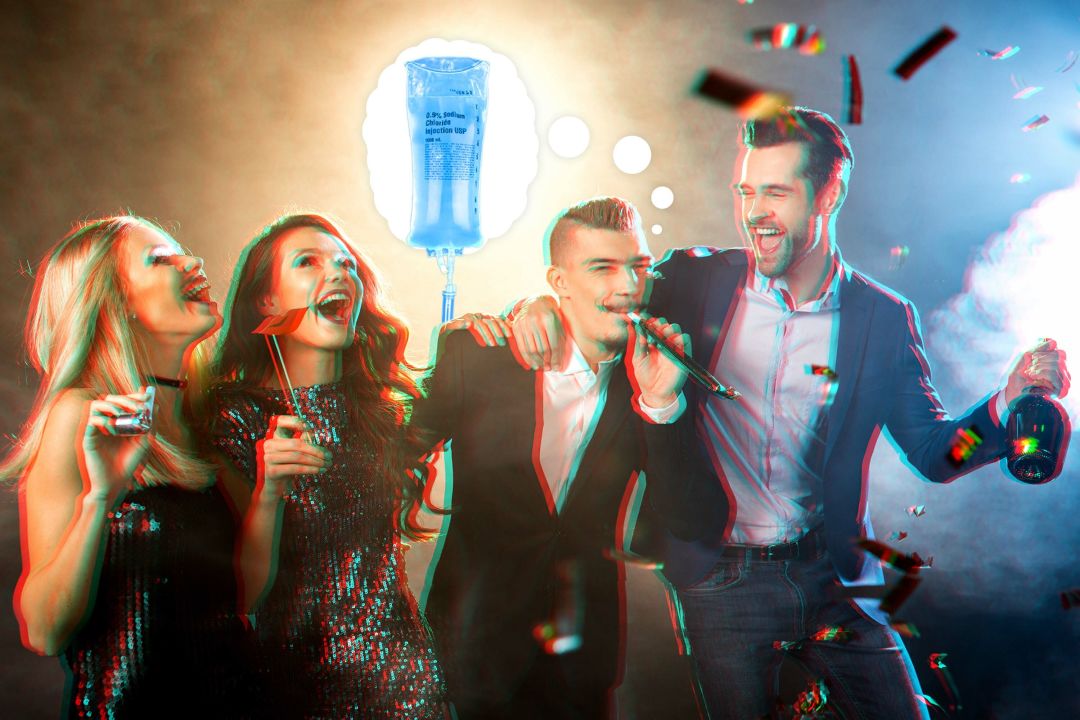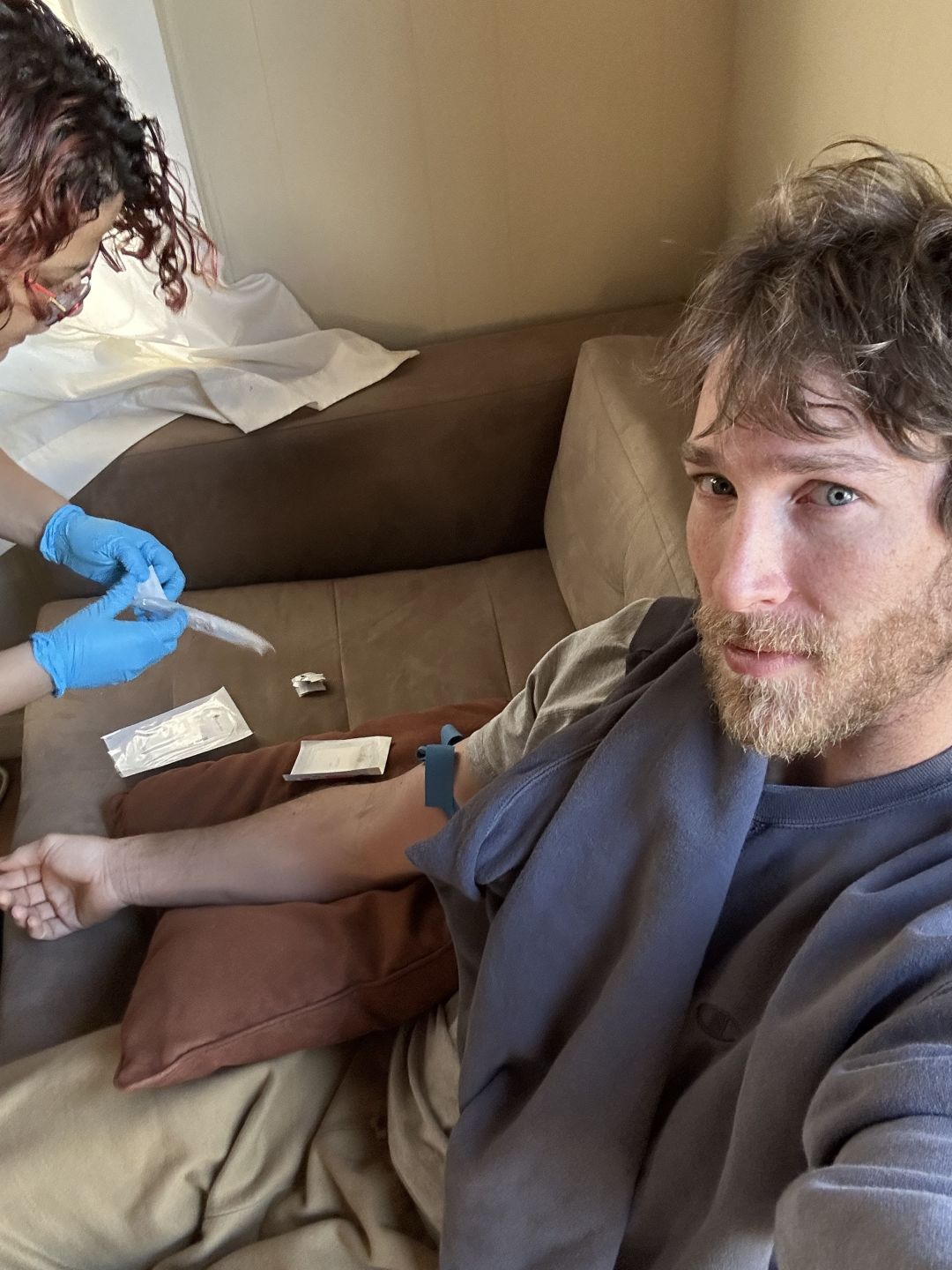Is IV Therapy a Miracle Cure For a New Year's Hangover?

Image: Kari Perrin/Shutterstock
While the best way to avoid a hangover on New Year’s Day is to not drink too much on New Year’s Eve, the decadent tradition always prevails and one too many glasses of cheap sparkling wine will go to our heads. But what good is all this technological progress if we have to suffer the consequences of our actions? Isn’t there some biological life hack that overrides the alcoholic karmic debt we will accrue?
For the past decade, boutique intravenous therapy lounges have popped up throughout the state of Florida. There are more than two dozen in the Sarasota-Manatee area alone. One of the services most of these alternative medical therapy companies offer is a “hangover cure.” So in preparation for our New Year’s Eve celebrations, I tried intravenous therapy. Is it a way of cheating pain? Or is it too good to be true?
What Is Intravenous Therapy?
What was once an emergency medical practice administered at hospitals by EMTs, nurses and doctors, intravenous (IV) therapy has been commercialized for the rest of us in non-emergency and preventative circumstances. IV therapy lounges have increased in popularity over the years and the global market size is expected to reach $18.9 billion by 2028. IV therapy proponents claim that by delivering nutrients directly into your bloodstream, you bypass the gastric system and the body can absorb nutrients more quickly and efficiently.
IV therapy clinics offer all kinds of different vitamin cocktails delivered through saline solution bags that promise myriad health benefits. Besides curing a hangover, proponents claim IV therapy can clear complexion, help with weight loss, alleviate chronic pain, detox the body, improve immunity and boost libido.
Most IV therapy clinics have lounges for walk-in visits, but some offer at-home visits for those dealing with particularly severe hangovers. Sarasota IV Lounge, located off U.S. 41 near Bahia Vista, delivers within 10 miles. In preparation for this story, I ordered a “hangover cure” from Sarasota IV Lounge, drank a six-pack before going to bed and consciously didn’t hydrate to guarantee a rough morning.
The Visit
I woke up groggy and irritable. At 10 a.m., a nurse arrived at my apartment. Her name was Naydaliz Soto and she could carry all of her equipment for the IV treatment from her car in one trip. Florida Statute 400.464 requires “home health” agencies to be licensed, and home infusion therapy providers “must be licensed as a home health agency or nurse registry.” Soto is a registered nurse and told me she had worked at a hospital for eight years. She also moonlights as a holistic life coach. She started working for Sarasota IV Lounge a year and a half ago and prefers it to the hustle and bustle of hospitals. “Here, I get to do preventative care,” she said. She got the needle in on her first try.

The author gets poked.
Image: Isaac Eger
The IV bag was filled with a saline solution the color of light yellow Gatorade. The $150 “hangover cure” contained vitamins that promised to “instantly support recovery” as well as “anti-inflammatory, anti-nausea, and acid reflux meds that alleviate headaches and GI distress.” I could feel the cold solution entering my veins and could also taste vitamins in my mouth. Soto told me that she had given hangover cures to wedding parties that might have been cancelled had they not received the treatment. One of the benefits, she told me, was that unlike ibuprofen, IV treatments don’t require a full stomach to be effective. So if you are having a hard time keeping food down, this might help.
Soto said that one of the downsides of the industry is that the solutions they put in your veins are not yet FDA approved. That means that you have to trust that the company is giving you good, clean nutrients. Soto tells me she trusts this one.
There are other concerns with the IV therapy industry. It is technically an invasive procedure, and like all invasive procedures, there are inherent risks. The treatment could damage blood vessels, cause swelling and inflammation, infections and blood clots. Many wonder whether the benefits claimed by the industry outweigh the risks.
Many in the medical community claim there is no evidence of health benefits from IV therapy. So far, there is little scientific evidence that the treatment does what it promises. Vitamins can be easily acquired through well-balanced diets. Only people who have had their small intestine removed due to illnesses like cancer have trouble absorbing edible nutrients and require IV vitamin therapy.
"For the most part, people report feeling better after these treatments because it's a rapid way to receive hydration," Dr. Sam Torbati, co-chair of emergency medicine at Cedars-Sinai of Los Angeles, says. Drinking dehydrates you and IV therapy will add fluids to your body. But you could get the same benefits from downing a sports drink. As for the claim that IV therapy is better because it bypasses the the gastric system and allows for increased nutrient absorption, Torbati said that comes with a risk. When you put something straight into the bloodstream, you bypass all of your body's built-in safeguards and filters.
"These treatments are mostly harmless and really just result in people making expensive urine,” he says.
The whole procedure took about an hour. I was told I would feel the beneficial effects even more the following day. I can’t say I felt a lot better, but perhaps I wasn’t hungover enough to notice a difference. However, I can remember some hangovers from my past where I felt like I was dying, couldn’t keep food or water down and could barely move. If that’s what you plan on feeling the morning of the first day of the new year, maybe an at-home IV treatment isn’t a bad idea.


